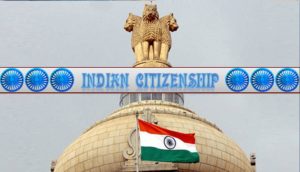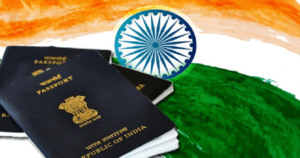Barak UpdatesAnalyticsBreaking News
States refusal to implement the Citizenship Amendment Act is unconstitutional, writes Urmisree Deb

December 20: Some States of India like, West Bengal, Punjab, Kerala, Madhya Pradesh etc. have declared that they would not implement the Citizenship Amendment Act, 2019 in their respective states. Now, the question is whether such a power is vested with the states or not.The essence of federalism is division of powers between the Union Government and the State Governments.
 The basic provisions regarding the distribution of powers between the Union and the States are in part XI of the Indian Constitution. This part is divided into two chapters containing 20 Articles. Chapter I (Article 245-255) deal with legislative relation and Chapter II (Article 256-263) deals with Administrative relation between the Union and the States of our country. Article 245(1) empowers the Parliament to make laws for the whole or any part of the territory of India, and the State Legislature may make laws for the whole or any part of the State.
The basic provisions regarding the distribution of powers between the Union and the States are in part XI of the Indian Constitution. This part is divided into two chapters containing 20 Articles. Chapter I (Article 245-255) deal with legislative relation and Chapter II (Article 256-263) deals with Administrative relation between the Union and the States of our country. Article 245(1) empowers the Parliament to make laws for the whole or any part of the territory of India, and the State Legislature may make laws for the whole or any part of the State.
 Further, the Parliament has also got exclusive power to make laws in respect of matters enumerated in List I in the Seventh Schedule of the Constitution under Article 246(1). List I in the Seventh Schedule of the Constitution is known as Union List and it contains 97 items. Item 17 of List I in the Seventh Schedule pertains to citizenship, naturalisation and aliens. So it is clear from the aforesaid discussion that the Parliament has exclusive power to make laws in regard to Citizenship matter.
Further, the Parliament has also got exclusive power to make laws in respect of matters enumerated in List I in the Seventh Schedule of the Constitution under Article 246(1). List I in the Seventh Schedule of the Constitution is known as Union List and it contains 97 items. Item 17 of List I in the Seventh Schedule pertains to citizenship, naturalisation and aliens. So it is clear from the aforesaid discussion that the Parliament has exclusive power to make laws in regard to Citizenship matter.
 It is true that the constitution confers certain power upon the State to make its own legislation with respect to any of the matters enumerated in List II in the Seventh Schedule of the Constitution under Article 246(3). This list called as State List and it contains 66 items. According to Article 246(2) of the Constitution, Parliament and the State Legislature have power to make laws with respect to any of the matters enumerated in List III (concurrent list) in the Seventh Schedule of the Constitution. In case an item is not mentioned in any of the three Lists, it is taken as a residuary subject and an implied subject should also kept in view.
It is true that the constitution confers certain power upon the State to make its own legislation with respect to any of the matters enumerated in List II in the Seventh Schedule of the Constitution under Article 246(3). This list called as State List and it contains 66 items. According to Article 246(2) of the Constitution, Parliament and the State Legislature have power to make laws with respect to any of the matters enumerated in List III (concurrent list) in the Seventh Schedule of the Constitution. In case an item is not mentioned in any of the three Lists, it is taken as a residuary subject and an implied subject should also kept in view.
 An implied subject is one whose meaning is understandably covered by some items having a specific place in any list. As for example, telecasting, though not mentioned in any List, is an implied subject being a part of broadcasting given in the Union List. This system is similar to the system that exists in the Constitution of Canada. An additional list called the Concurrent List has also been added in our Constitution on the pattern of the Constitution of Australia. Article 11 of our Constitution also serves the purpose of removing any doubts that could be entertained about the absolute and exclusive power of Parliament to deal with the Citizenship in India.
An implied subject is one whose meaning is understandably covered by some items having a specific place in any list. As for example, telecasting, though not mentioned in any List, is an implied subject being a part of broadcasting given in the Union List. This system is similar to the system that exists in the Constitution of Canada. An additional list called the Concurrent List has also been added in our Constitution on the pattern of the Constitution of Australia. Article 11 of our Constitution also serves the purpose of removing any doubts that could be entertained about the absolute and exclusive power of Parliament to deal with the Citizenship in India.
 Part II of the Constitution defines several categories of Indian Citizens at the commencement of the Constitution. Articles 5 to 9 of the Constitution determine who are Indian citizens at the commencement of the constitution and Article 10 provides for their continuance as such citizens subject to the provisions of any law that may be made by Parliament. But, there is nothing in the constitution to specifically deal with the cases of acquisition of Citizenship after the commencement of the Constitution or the termination of Citizenship or other matters relating to the Citizenship, which matters were left to the Law-makers, under Article 11, by virtue of other parliamentary legislations. Under Article 11, the Constitution expressly saves the power of Parliament to make a law provided for such matters.
Part II of the Constitution defines several categories of Indian Citizens at the commencement of the Constitution. Articles 5 to 9 of the Constitution determine who are Indian citizens at the commencement of the constitution and Article 10 provides for their continuance as such citizens subject to the provisions of any law that may be made by Parliament. But, there is nothing in the constitution to specifically deal with the cases of acquisition of Citizenship after the commencement of the Constitution or the termination of Citizenship or other matters relating to the Citizenship, which matters were left to the Law-makers, under Article 11, by virtue of other parliamentary legislations. Under Article 11, the Constitution expressly saves the power of Parliament to make a law provided for such matters.
 In exercise of the plenary powers conferred by the Constitution, the Indian Parliament enacted the Citizenship Act (LVII of 1955) by virtue of power under Article 246(1) and Article 11 of the Constitution of India and received the assent of the President of India on 30 December, 1955 to provide a substantive and procedural framework with respect to acquisition and determination of citizenship subsequent to the commencement of the Constitution. The said Citizenship Act, 1955 has been amended on several times by the Parliament of India i.e. Citizenship Amendment Acts of 1986,1992, 2003, 2005 & 2015.
In exercise of the plenary powers conferred by the Constitution, the Indian Parliament enacted the Citizenship Act (LVII of 1955) by virtue of power under Article 246(1) and Article 11 of the Constitution of India and received the assent of the President of India on 30 December, 1955 to provide a substantive and procedural framework with respect to acquisition and determination of citizenship subsequent to the commencement of the Constitution. The said Citizenship Act, 1955 has been amended on several times by the Parliament of India i.e. Citizenship Amendment Acts of 1986,1992, 2003, 2005 & 2015.
 Similarly, the Citizenship Amendment Act, 2019 was duly made by the Parliament very recently by virtue of power under 246(1) of the Constitution of India and President of India assented on it and the same is already published in the Official Gazette of India. Article 13 of the Constitution of India contains an inclusive definition of “law”. One of the major legal sources is the enacted law. The said Citizenship Amendment Act has extended the facility of Indian Citizenship to a specific class of persons who are presently facing hardships and difficulties in acquiring citizenship. It will enable acquisition of Indian Citizenship from the date of his entry into India by a person belonging to Hindu, Sikh, Buddhist, Jain, Parsi and Christian communities from Pakistan, Bangladesh and Afghanistan who was forced or compelled to seek shelter in India due to religious persecution in those countries.
Similarly, the Citizenship Amendment Act, 2019 was duly made by the Parliament very recently by virtue of power under 246(1) of the Constitution of India and President of India assented on it and the same is already published in the Official Gazette of India. Article 13 of the Constitution of India contains an inclusive definition of “law”. One of the major legal sources is the enacted law. The said Citizenship Amendment Act has extended the facility of Indian Citizenship to a specific class of persons who are presently facing hardships and difficulties in acquiring citizenship. It will enable acquisition of Indian Citizenship from the date of his entry into India by a person belonging to Hindu, Sikh, Buddhist, Jain, Parsi and Christian communities from Pakistan, Bangladesh and Afghanistan who was forced or compelled to seek shelter in India due to religious persecution in those countries.
 As such, State Legislature has no power to make laws in respect of “Citizenship”. In case, if the States refuse to implement the said law, it would be in gross violation of the constitution of India and then there is a possibility of invoking Article 356 of the constitution of India i.e. failure of constitutional machinery in the states (President’s Rule). Article 356(1) of the constitution provides that if the president on receipt of report from the Governor of a State or otherwise, is satisfied that a situation has arisen in which the government of the State cannot be carried on in accordance with the provisions of this constitution, the President may by proclamation assume to himself all or any of the functions of the State and declare that the powers of the Legislature of the State shall be exercised by or under the authority of the Parliament.
As such, State Legislature has no power to make laws in respect of “Citizenship”. In case, if the States refuse to implement the said law, it would be in gross violation of the constitution of India and then there is a possibility of invoking Article 356 of the constitution of India i.e. failure of constitutional machinery in the states (President’s Rule). Article 356(1) of the constitution provides that if the president on receipt of report from the Governor of a State or otherwise, is satisfied that a situation has arisen in which the government of the State cannot be carried on in accordance with the provisions of this constitution, the President may by proclamation assume to himself all or any of the functions of the State and declare that the powers of the Legislature of the State shall be exercised by or under the authority of the Parliament.
 In conclusion, if the state of West Bengal or any other states of our country refuse to implement the Citizenship Amendment Act, 2019 in their respective States, it would be unconstitutional and it may warrant invocation of Presidents’s Rule under Article 356 of the constitution of India or impose sanctions for compliance with the same as there is a failure of constitutional machinery. So, the state of West Bengal or any other such States of our country is bound to implement the Citizenship Amendment Act, 2019 which was duly made by the Parliament of India unless and until the said Act is held to be unconstitutional by the Supreme Court of India.
In conclusion, if the state of West Bengal or any other states of our country refuse to implement the Citizenship Amendment Act, 2019 in their respective States, it would be unconstitutional and it may warrant invocation of Presidents’s Rule under Article 356 of the constitution of India or impose sanctions for compliance with the same as there is a failure of constitutional machinery. So, the state of West Bengal or any other such States of our country is bound to implement the Citizenship Amendment Act, 2019 which was duly made by the Parliament of India unless and until the said Act is held to be unconstitutional by the Supreme Court of India.

(Views expressed in this article are solely of the author and does not necessarily reflect the views of the portal)



